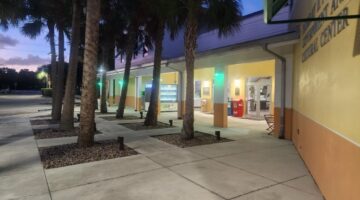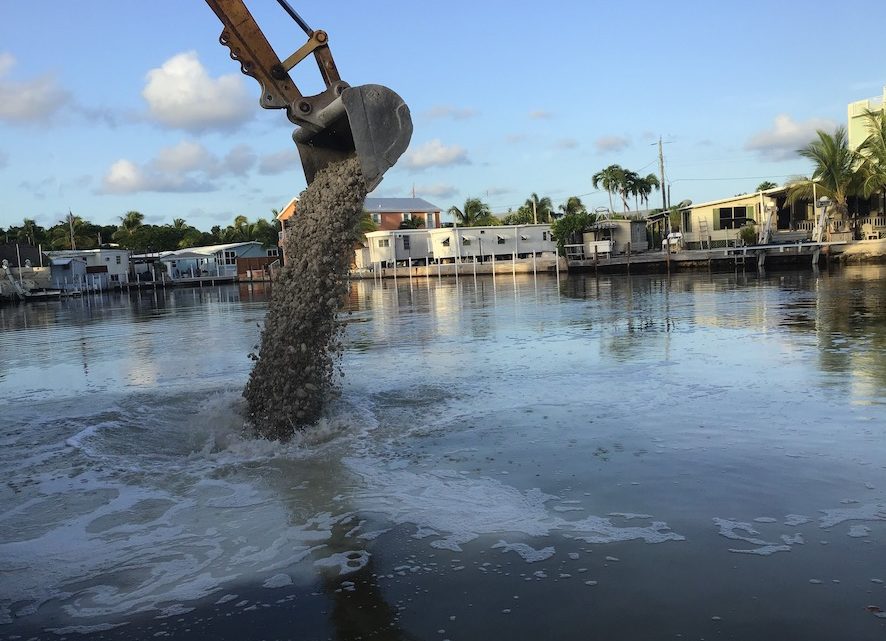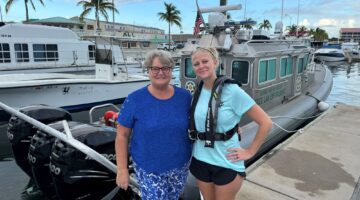Commissioners Receive Sustainability, Resilience, and Water Quality Updates Upcoming this Year
MONROE COUNTY, FL – Monroe County Chief Resilience Officer Rhonda Haag presented an update on this year’s resilience and water quality efforts, including canal restoration projects, breakwater repair and shoreline resilience projects, road adaptations, and municipal resilience partnerships at Wednesday’s Board of County Commissioners meeting.
Canals
This year, the County is moving forward with $5.5 million in State-funded restoration efforts to restore 12 canals to improve water quality. The canals are the top-ranked on the County’s list of 96 canals that do not meet state water quality standards. The restoration methods include culverts, injection wells, organic removal, backfilling, and air curtains. Haag hosted community meetings with the homeowners in advance to inform them of the potential restoration, project benefits, and potential costs to the residents. Assessments are required to fund the long-term operations and maintenance of weed gates required in several projects. The County funds the construction costs of the projects through grants.
“This is our biggest one-year restoration list ever, so we are very excited about moving forward,” said Haag.
1) Canal #105 backfill and culvert. Located in Tavernier / Key Largo. Restoration cost estimate $668,870.
2) #255 organic muck removal, backfilling, air curtain, and injection well. Located on Big Pine Key. Restoration cost estimate $300,000
3) #315 organic muck removal, backfilling, and air curtain. Located between on Big Pine Key. Design only. Restoration cost estimate $2,373,982.
4) #295 organic muck removal, backfilling, and air curtain. Located in the avenues on Big Pine Key. Restoration cost estimate $1,040,726.Design only
5) Canal #297 organic muck removal, backfilling, and air curtain. Located in the avenues on Big Pine Key. Total restoration cost estimate $1,352,390.
6) #290 backfilling and air curtain. Located in the avenues on Big Pine Key. Total restoration cost estimate $900,000
7) #287 organic muck removal, backfilling, and air curtain. Located on Big Pine Key. Total restoration cost estimate $2,942,881
8) #82 organic muck removal, backfilling, and air curtain. Located between in Key Largo. Total restoration cost estimate $2,547,229.
9) #474 backfill and air curtain. Located on Geiger Key. Total restoration cost estimated $220,650.
10) #278 injection well. Located in the Eden Pines on Big Pine Key. Total restoration cost estimated $250,000
11) #58 injection well. Located in the Calusa Campground of Key Largo. Total restoration cost estimated $250,000
12) #293 organic muck removal, backfill, and air curtain. Located in the avenues on Big Pine Key. Total restoration cost $2,145,335. Design funded by DEP Ft. Myers.
Breakwater Repair Projects
Two breakwaters damaged during Hurricane Irma are being rebuilt to restore protection to homes from storm surges. The County received more than $3 million in federal grant funding for the breakwater repairs. One is located in Tavernier, and the other is in Rock Harbor. The restored breakwaters will provide much-needed resilience against storm surges and stop most floating sargassum seaweed from entering and clogging the canals behind the breakwaters.
Resilience Planning
The County is moving forward with several State-funded resilience planning projects, including a resilient design for Pigeon Key and Harry Harris Park. The County is also updating its Watershed Management Plan, which is required to maintain the County’s CRS rating of “3”. The lower the CRS score, the bigger the discount for home National Flood Insurance Policy discounts. Finally, the County is updating its Vulnerability Assessment and developing a natural resource habitat assessment.
Municipal Resilience Projects
The County is well underway with its efforts to provide all five municipalities with the mobile LiDAR survey data needed for street elevation planning. Plans are also moving forward to begin the next phase of street elevation planning for the municipalities, using the data collected during the mobile LiDAR stage. The municipalities are funding the work.
The County is also leading an effort to conduct Watershed Management Plan updates for the municipalities to help them improve their Community Rating System (CRS) scores and update their Vulnerability Assessments. The State’s Resilient Florida grant program is funding the resilience planning work.
Shoreline Resilience
The County received two State grants for the creation of living shorelines to provide resilience and improved wetland habitats and will be moving forward soon:
- Long Key Living Shoreline
- Duck Key Living Shoreline and Breakwater Repair Project
Road Elevations and Stormwater
A presentation at the meeting provided the legal and policy challenges the County faces regarding road adaptation projects. The Commissioners directed staff to begin the process of code and comprehensive plan changes needed to move forward.
U.S. ARMY CORP OF ENGINEERS UPDATE
The Commissioners heard an update from the Army Corps of Engineers regarding the $2.7 billion Florida Keys Coastal Storm Risk project, which includes options for dry floodproofing critical infrastructure, elevating 4,698 residential homes, and U.S. 1 shoreline stabilization. The plan addresses critical infrastructure, evacuation-route protection, and structural-damage reduction in response to coastal storm risks and effects and associated impacts such as sea-level rise, storm surge, and extreme wind and tidal effects.
“The County received the fantastic news that not only was the project itself recently approved by Congress, but the first appropriation for design and engineering of the U.S. 1 revetments was authorized,” said Haag.
The entire project will be in phases over several years. The first phase will be the stabilization of U.S. 1 in six areas. Design is anticipated to begin within the next year and includes revetments along U.S. 1 at mile markers 79.5, 70, 70.9, 67, 37, and 34.5. Construction will require separate future appropriations from Congress. For more information on the Army Corps of Engineers projects, visit https://www.saj.usace.army.mil/FloridaKeysCSRMFeasibilityStudy/.





No Comment